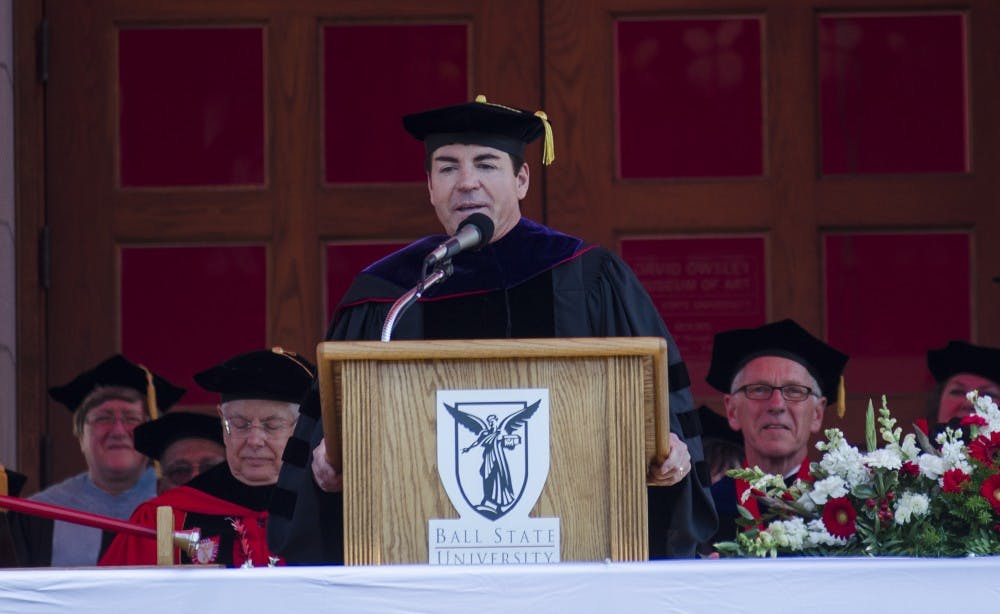In 2014, private foundations led by the Koch brothers gave more than $23.4 million to U.S. colleges
Other universities that have received donations:
- Indiana University
- Florida State University
- The Catholic University of America in Washington, D.C.
- Creighton University in Nebraska
- Troy University in Alabama
Source: Center for Public Integrity
After the university received a $3.25 million grant from alumnus John "Papa John" Schnatter and the Charles Koch Foundation, some questions and concerns have been raised around the university, as well as other universities where the Koch foundation gave money.
Billionaire brothers Charles and David Koch have been known for funding conservative and libertarian causes in the past, and some people worry the donation, which will be used to fund the new John H. Schnatter Institute for Entrepreneurship and Free Enterprise, must be coming with strings attached.
But Michael Goldsby, the chief entrepreneurship officer and professor of entrepreneurship who will be leading the institute, said that is not the case.
“We have autonomy in who we hire and how we run the institute and its programs,” Goldsby said.
However, 2015 alumnus Joseph Knoop said the donation, coupled with the recent transparency issues regarding the resignation of former President Paul W. Ferguson, was worrisome.
"When one of the world's wealthiest families and business networks invests more money than you or I may ever see in our entire lives to public colleges, that should give us pause for thought," Knoop said.
He said he doesn't doubt wealthy people can be philanthropic, but when their intention is to reshape the minds of students and those who lead them, it becomes a problem.
"A truly virtuous donation would include stipulations that no political influence can be gained as a result, but we all know that's laughable," he said. "A university with a recently ousted president, for reasons still unknown? And a multi-million dollar investment from the poster boys for political corruption? Draw your own conclusions, but not your own facts."
Read a student's critique of the donation here.
However, Goldsby said one of the key principles of the new institute will be free speech, and the grant and institute will be focused on a values-based form of entrepreneurship.
“I see a university as a free market of ideas, and students should have exposure to a broad range of concepts,” Goldsby said. “Additionally, they should also be free to express their opinions. My door is open to anyone who wants to support education and help advance our students, especially as a public university.”
The grant will support campus-wide entrepreneurial learning and thinking, he said. It will allow the university to train faculty from colleges across campus to add entrepreneurial learning into their courses, give training in Indiana communities and train campus leaders to creatively solve problems with how they run the university.
“It helps us do a lot more of what we're already good at at Ball State,” Goldsby said.
Sami Soutar, a sophomore entrepreneurial management major, said she thinks the grant will be beneficial to expand the university's college of business.
As a student in the Miller Business Honors program and a Miller Scholar, she said she's seen and benefited from the good that has come from programs, classes and scholarships the university wouldn't be able to offer without outside donations.
"I am just supportive of the Miller College of Business and trust the choices of their faculty since I have worked closely and been helped personally by many of them," Soutar said.
Because the university just received the grant, administration will take the spring to determine plans and an opening date.
Although the grant is recent, Joan Todd, university spokesperson, said the thinking behind advancing entrepreneurship within the university has been ongoing.
“The institute, the Miller College of Business and the university have been developing our entrepreneurial programs as part of our ongoing strategic initiatives,” Todd said. “The generous grants from John Schnatter and The Charles Koch Foundation will allow us to more quickly implement our plans. In fact, it was our strategic priorities that impressed Mr. Schnatter when he visited Ball State last year to present the commencement address.”
Todd said the university is fortunate to have the support of donors like Schnatter and The Charles Koch Foundation. She said one significant benefit to all students is money from donors helps keep tuition down.
Ultimately, Goldsby said the grant is a positive thing for the university.
“[The grant] helps Ball State do campus-wide activities in a way that other universities don't," Goldsby said. "We have a unique opportunity to exemplify this entrepreneurial approach, and we're getting external support because the world needs problem solvers."
In 2007, a million-dollar offer to Florida State University's economics department did come with strings attached, according to publicintegrity.org. The Charles Koch Foundation wanted the curriculum to align with the libertarian philosophy of Charles Koch, and the foundation would be able to partially control which faculty members were hired. However, this was discovered seven years after the offer, and the current deal with Florida State does not include this criteria.
A $210,000 grant given to Indiana University in late January also led to concern at the university, according to an Indianapolis Star story. Students and faculty there were also skeptical, thinking the money could come with strings attached and the foundation could influence how the money was used.





